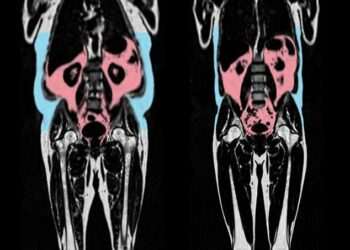New blood tests for Alzheimer’s disease offer a potential way to get faster diagnosis, and as a result, put patients on the pathway to treatment.
While a range of blood tests are now available, experts have yet to actually assess their accuracy compared to more complex or invasive brain scans and spinal fluid tests which are currently considered the diagnostic standard.
But a new study, by experts from the Washington University School of Medicine in the US, aims to change that.
Scientists compared six blood tests for Alzheimer’s which measure different molecules in the blood, called biomarkers, which indicate someone has the disease to see if they were as accurate as current methods.
To do this they compared blood samples from 392 patients, with an average of 78, of which half exhibited cognitive impairment, a potential sign of the disease.

While a range of blood tests are now available, experts have yet to actually assess their accuracy compared to more complex or invasive brain scans and spinal fluid tests which are currently considered the diagnostic standard
Presenting their findings at the Alzheimer’s Association International Conference in Philadelphia today the experts said of the six tests four reached a 90 per cent accuracy threshold.
They noted all four of these tests were designed to home in on one specific biomarker, a form of tau known as phosphorylated tau 217 (p-tau217).
Tau is type of protein found in the brain that in Alzheimer’s patients acts abnormally, forming tangles that impede the function of the neurons causing a variety of problems, the most famous of which is dementia.
Lead researcher of the project and expert in neurology, Suzanne Schindler, said such head-to-head comparisons are important so doctors can help treat their patients more effectively.
‘Some of the blood tests are accurate and some are not, and doctors don’t know which tests to use,’ she said.
‘With this head-to-head comparison, doctors now have more reliable information about which tests will best help them provide an accurate diagnosis to their patients.’
The six tests analysed were those made by companies or ventures ALZpath, C2N Diagnostics, Fujirebio Diagnostics, Janssen, Quanterix and Roche Diagnostics.
Of these, ALZpath, C2N Diagnostics, Fujirebio Diagnostics and Janssen, which examined P-tau 217 performed the best according to the authors. Of this subgroup C2N Diagnostics, Fujirebio Diagnostics were the top performers.
Ms Schindler said they set the diagnostic accuracy the tests had to reach as the same as the cerebrospinal fluid tests, which are approved in the US for diagnosing Alzheimer’s.
‘We concluded that, to be used without a second test, blood tests need to be as accurate as FDA-approved cerebrospinal fluid tests, which are approximately 90 per cent sensitive and specific at identifying Alzheimer’s disease in cognitive impaired individuals,’ she said.
‘In this current study, the p-tau217 tests met that standard, but the others did not.’
Fellow researcher Kellen Petersen, also an expert in neurology, said the identification of single biomarker as distinguishing factor of the head-to-head test comparison, compared to a combination of biomarkers, was contrary to some expectations.

Around 900,000 Brits are currently thought to have the memory-robbing disorder. But University College London scientists estimate this will rise to 1.7million within two decades as people live longer. It marks a 40 per cent uptick on the previous forecast in 2017
‘Some people thought that we might need to measure multiple biomarkers to get at the different features of Alzheimer’s disease That’s not what we found,’ he said.
‘P-tau217 alone can do it all. It accurately predicted levels of amyloid and tau in the brain, brain volumes and cognitive symptoms. It was more accurate than any other biomarker, or even any combination of biomarkers, across the board.’
The authors highlighted how rapid and accurate testing of Alzheimer’s is increasingly critical given how the Food and Drug Administration in the US has recently approved two drugs the slow the progression of the disease.
While the drugs, as lecanemab and donanemab, have been described as gamechangers, they only work effectively when Alzheimer’s is in its very early stages meaning rapid diagnosis is critical to their success.
A current lack of Alzheimer’s testing capacity the UK has prompted experts to warn that as many as four out of five patients who could benefit from the new drugs could miss out.
Neither lecanemab nor donanemab are currently approved in the UK though a decision from British regulators is expected this year.
The study has a number of limitations, the first is that it is being presented at a conference and has not been published in a peer review journal.
The authors themselves another limitation is the small sample size used in the study.
Reacting to the study, Dr Jacqui Hanley, head of research funding at charity Alzheimer’s Research UK, said: ‘Too many people in the UK are left anxiously waiting for a dementia diagnosis, up to two years on average, and more than four years if they are under 65.’
‘Blood tests, used in combination with other tests, are showing huge promise to help diagnose the diseases that cause dementia, and have the potential to be quicker but just as accurate as PET scans and lumbar punctures.
‘But none have been validated to use as part of the diagnosis pathway in the UK.’
She said the recent study was promising despite a number of limitations.
‘This study, carried out in the US and which is yet to be peer reviewed, compares different commercial blood tests and current diagnosis pathways to understand which is the most accurate way of diagnosing Alzheimer’s disease,’ she said.

There are multiple possible signs of dementia a memory-robbing condition plaguing nearly 1million Brits and seven million Americans
‘It adds to the growing evidence that blood tests, particularly those that measure levels of p-tau217, can diagnose Alzheimer’s disease and other causes of dementia, and have the potential to revolutionise the way dementia is diagnosed.
‘However, the companies providing the tests for this study also provided the data, which was limited. And only a small number of people were included, so they were not representative of the general population.’
Dr Hanley added that before being introduced in the UK such blood tests needed to be tested more widely and Alzheimer’s Research UK was already funding projects to do this.
‘This groundbreaking project aims to transform the way dementia is diagnosed, by validating blood tests for diagnosing dementia that can be used within the NHS within the next 5 years,’ she said,
In the UK Alzheimer’s is typically diagnosed after a mental test to see if a patient is suffering from any signs of cognitive impairment.
This is then followed up by assessment such as brain scan to see if Alzheimer’s is the most likely cause.
The NHS warns that it may take several appointments and tests over many months before an Alzheimer’s diagnosis is confirmed.

Hundreds of participants were judged on how healthy their life was, logging a score of between zero and six based on all the different factors. Volunteers who didn’t break a sweat for at least ten minutes a day for three or four days a week got nothing. The other lifestyle habits related to alcohol consumption, smoking status and quality of sleep. Social interaction and having hobbies were the other two factors
While Alzheimer’s is the leading cause of dementia other health problems like reduced blood flow to the brain, called vascular dementia, also need to be considered.
Charity The Alzheimer’s Society reports there are around a million people living with dementia in the UK today. This is projected to rise to 1.4 million by 2040.
Meanwhile in the US there an estimated 7million people living with dementia.
It comes as promising research suggests a diabetes jab already prescribed to thousands of NHS patients could slash the risk of developing Alzheimer’s.
Liraglutide — sold under the brand name Saxenda — is offered to people with type 2 diabetes as it cuts blood sugar and aids weight loss.
Now, research suggests the once-a-day injections could also slow cognitive decline in Alzheimer’s patients by as much as 18 per cent.
Researchers today said the findings ‘provide hope’ and could pave the way for new dementia treatments, meaning further research was vital.









